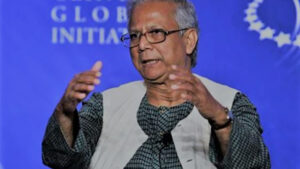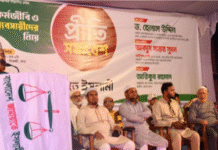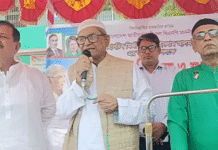By Ahammad Foyez on Jul 01, 2022
Eighty-year-old Nobel Prize winner and Grameen Bank founder Muhammad Yunus has issued a comprehensive rebuttal of years of criticism from the Bangladesh government, stating, among other points, that he had no involvement in the World Bank’s cancellation of financing ten years ago for the Padma Bridge.
A government minister on Thursday called Yunus’ statement “devoid of truth” and an effort “to cover fish with vegetables.” Revered worldwide for pioneering microcredit as a method of lifting millions out of poverty, Yunus has been in the crosshairs of the Awami League government ever since he won the Nobel Peace Prize in 2006 and became a household name.
It has alleged that Yunus used his friendship with former U.S. Secretary of State Hillary Clinton to pressure the World Bank to withdraw funding for the vaunted Padma Bridge, which Bangladesh eventually built with its own money and inaugurated with much fanfare on June 25.
The Nobel laureate, via a statement through the Yunus Center on Wednesday, laughed off the allegation, saying that the Padma Bridge has been his dream as much as it had been of all other Bangladeshis.
“The tough world of international decision-making does not depend on the whims of two friends …. However ‘important’ a person Professor Yunus may be, whatever number of ‘influential friends’ he may have, a three-billion dollar project cannot be stopped just because he allegedly wants it cancelled,” the statement says.
“In response to the allegations, it has to be said again that Professor Yunus has never made any complaint to the World Bank or any other organization or individual about the Padma Bridge. So the matter is purely imaginary.”
Yet, his denial did not faze the government. Hasan Mahmud, the information and broadcasting minister, stuck to his guns, using colorful language to repeat the administration’s allegations.
“[I]t is clear as broad daylight that Dr. Yunus played the role of the key perpetrator in scrapping the World Bank’s credit for Padma Bridge as he has a special intimacy with Hilary Clinton. Everyone at home and abroad knows it,” Mahmud said at a press conference, referring to the Yunus Center’s statement.
How did the cycle of recriminations begin? Many observers say that a series of unconnected events have led to this point.
‘Two independent stories’
Yunus, who won the Nobel in 2006, reportedly first came to the attention of the Awami League when he formed a political party named ‘Nagarik Shokti,’ or Citizens’ Power. This took place when an army-backed caretaker government was in power in 2007-2008, at a time of political turmoil due to a state of emergency imposed in the country.
At that time, current Prime Minister Sheikh Hasina, and her main rival, former PM Khaleda Zia, had been arrested in various corruption cases. It is said that Yunus and some civil society figures, including some newspaper editors, were trying to remove Hasina and Khaleda from politics. Their alleged attempt has since come to be called the “Minus Two Formula.”
True or not, Hasina triumphed. She and her Awami league won the national election, returning to power in 2009. All the cases against Hasina were dismissed. She was firmly in power.
Two year later, Bangladesh’s central bank removed Yunus from his position as head of Grameen Bank, the microlender he created and that won him the Nobel Peace Prize, over a retirement age- -related issue. A year later, the World Bank canceled a U.S. $1.2 billion loan to build the Padma Bridge, citing corruption concerns.
The Awami League says that Yunus, angry about his dismissal, pressured the World Bank to block funding to the Padma Bridge.
For his part, Yunus says, the two separate issues are being incorrectly conflated. One, he says, has nothing to do with the other.
“The global shock created by [the] removal of Professor Yunus from the position of Managing Director of Grameen Bank is an independent story unfolding at the same time when the World Bank was warning to stop Padma Bridge funding because of corruption,” the Yunus Center statement said.
“Mixing these two independent stories into one story took it to a different path.”
Meanwhile, there are Bangladeshis who are not interested in taking sides.
Ali Imam Majumder, a former cabinet secretary who is secretary-general of Transparency International Bangladesh, is one of them.
“I just want to say that both the Padma Bridge and Dr. Yunus are a matter of pride for our nation,” he told BenarNews.
“I have emotions for the Padma Bridge as it was constructed at our own cost. I also have emotions for Dr. Yunus as he was the first Bangladeshi after Bangabandhu Sheikh Mujibur Rahman [the founding president of Bangladesh] who represented Bangladesh in global forums on such a huge scale.”










